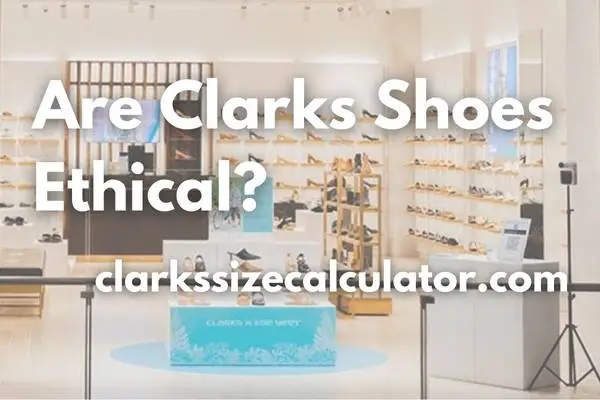Are Clarks Shoes Ethical?
Have you ever wondered where your shoes come from and how they are made? If you are a fan of Clarks, one of the most well-known shoe brands in the world, you might be curious about their ethical and environmental practices. Clarks claims to be committed to sustainability, social responsibility, and ethical sourcing. But how true are these claims? Are Clarks shoes ethical?
In this blog post, we will examine some of the aspects of Clarks’ sustainability practices, such as their use of leather, their environmental impact, and their treatment of workers.
Are Clarks Shoes Ethical?
No, Clarks shoes are not ethical. They use leather from animals, which causes animal suffering and environmental pollution. They also do not provide enough information on their environmental impact, their supply chain, or their workers’ rights. They have some vegan and recycled options, but they are not enough to make them a sustainable and ethical shoe brand.
Leather
One of the main materials that Clarks uses for its shoes is leather. Leather is a controversial material in terms of ethics and sustainability, as it involves animal suffering, environmental pollution, and human health risks. Clarks states that they only use by-product leather from the food industry, which would otherwise end up as waste. They also say that they follow strict environmental, animal welfare, and supply chain policies for their leather sourcing.
However, some critics argue that leather is not a by-product of the meat industry, but a profitable co-product that drives the demand for animal agriculture. They also point out that leather production involves toxic chemicals such as chromium, which can cause serious problems for local communities and ecosystems if not disposed of properly. Therefore, some consumers may prefer to avoid leather altogether and opt for vegan alternatives.
Vegan Alternatives
Clarks offers some vegan options for its customers who do not want to wear animal-derived materials. For example, they have a collection called Origin 2.0, which features shoes made from recycled materials and zero glue. They also have a collaboration with Frugi, a children’s clothing brand that uses organic cotton and recycled materials. These vegan shoes are designed to be durable, comfortable, and breathable.
However, not all vegan alternatives are necessarily better for the environment than leather. Some synthetic materials, such as PVC or PU, can also contain harmful chemicals and be non-biodegradable. Therefore, consumers should look for vegan shoes that use natural or recycled materials that have a lower environmental impact.
Environmental Impact
Clarks claims to be conscious of its environmental impact and strives to reduce its carbon footprint, water consumption, and waste generation. The company has set some targets for 2025, such as reducing its greenhouse gas emissions by 30%, its water use by 50%, and its waste to landfill by 90%. They also say that they use renewable energy sources for their operations and support various initiatives to protect the planet.
However, some of these targets are not very ambitious compared to other shoe brands. For instance, Po-Zu, a UK-based ethical shoe brand, has achieved carbon neutrality since 2017 and uses 100% renewable energy for its production. Moreover, Clarks does not provide much information on how they measure and report their environmental performance or how they verify their claims.
Workers’ Rights
Another aspect of ethical shoe production is the respect for workers’ rights. Clarks sources its materials and manufactures its products in several countries around the world. The company says that it follows the Ethical Trading Initiative (ETI) Base Code, which sets standards for labour rights such as fair wages, safe working conditions, and freedom of association. They also say that they conduct regular audits and assessments of their suppliers and provide training and support for them to improve their practices.
However, Clarks does not disclose much detail about its supply chain or its audit results. It is also unclear how they address the issues of forced labour, child labour, or gender discrimination that are prevalent in the shoe industry.
Conclusion
In conclusion, Clarks shoes are not completely ethical or sustainable based on their use of leather, lack of transparency around environmental impact, and unknown labour practices. While they offer some vegan and eco-friendly options, the majority of their shoes still contain leather sourced questionably and materials with uncertain impacts. They have set some environmental goals for 2025 but lag behind other brands in ambition and verification of progress.
Most concerning is the lack of supply chain transparency and assurance of fair worker treatment. Thus, consumers who prioritize ethics and sustainability should exercise caution when purchasing from Clarks until more information and progress is provided.

